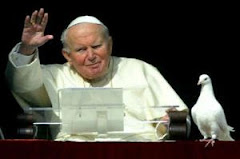
No Partisan Politics for Pope in US
By RACHEL ZOLL –
NEW YORK (AP) — Organizers of Pope Benedict XVI's visit to the United States next week have taken great pains to keep him out of presidential politics.
But the Roman Catholic teaching he's expected to emphasize — on abortion, human rights and other issues — has policy consequences that partisans will inevitably spin for their own ends.
"The pope will probably speak in broad enough and general enough terms that anybody who is determined to read endorsement of his or her political position will find an endorsement there," said Russell Shaw, a former spokesman for the U.S. Conference of Catholic Bishops and a consultant to the Pontifical Council for Social Communications. "But when and if that happens, it is going to be people reading things into the pope's remarks that aren't there."
Catholic leaders don't always avoid politics.
Pope John Paul II's emphasis on human dignity, religious freedom and absolute truth helped bring down communism. During a 1999 visit to St. Louis, John Paul convinced then Missouri Gov. Mel Carnahan to spare the life of convicted killer Darrell Mease, who was days away from execution.
However, Catholic beliefs aren't meant to be partisan.
Church teaching doesn't fit neatly into any one political agenda, a hard lesson American presidential candidates have learned as they have courted Catholic voters in recent years. Catholics make up about one-quarter of the electorate nationwide and don't vote as a bloc.
The church opposes abortion and embryonic stem cell research, while supporting immigrant families and aid to the poor. Catholic teaching says marriage should only be the union of one man and one woman. Yet Benedict also supports the U.N. and protecting the environment.
"Catholic teaching, taken in its full integrity, will have something to both please and aggravate Democrats and Republicans," said the Rev. James Heft, professor of religion at the University of Southern California. "Politics is not the first concern of the church. Basic moral issues, issues of justice, are a preoccupation."
Benedict's first trip to the U.S. as pope runs from next Tuesday through April 20 in Washington and New York. His visit ends just two days before the critical state primary in Pennsylvania, where Catholics comprise nearly one-third of voters. Sens. Barack Obama and Hillary Rodham Clinton, the remaining Democratic contenders, are pressing for the Catholic vote.
It's an inconvenient coincidence for the Vatican, but it could have been worse.
The pope is traveling here partly to address the United Nations on April 18. Heads of state usually speak at the U.N. during its fall General Assembly session, as John Paul did. But that would have put Benedict in the U.S. right before the Nov. 2 general election.
At other events, the pope's public appearances with political figures will be limited.
In Washington, President George W. Bush and first lady Laura Bush will host the pontiff Wednesday at the White House, as they do for visiting heads of state. Church leaders expect the event to be bipartisan. The pope doesn't meet with candidates for political office, but the three contenders for the U.S. presidency, all senators, could participate in events that include congressmen or are open to the public.
For the Masses at Nationals Park and Yankee Stadium, any invited politicians will sit in special sections away from the altar, partly for security reasons, according to organizers.
When Benedict visits ground zero, the site of the World Trade Center attack, on April 20, the only public figures invited to accompany him are New York Mayor Michael Bloomberg, New Jersey Gov. Jon Corzine and New York Gov. David Paterson. The site is owned and managed by the Port Authority of New York & New Jersey.
Despite the extensive Vatican safeguards against partisanship, political activists are already trying to anticipate what the pope will say and how it will benefit or hurt them.
"The Republicans are just hoping and praying he'll say something strong about abortion and gay marriage and the Democrats are dreading it," said the Rev. Thomas Reese, a political scientist and senior fellow at Woodstock Theological Center at Georgetown University. "But when he goes to the U.N., he's going to say things that are going to be to the left of Hillary and Obama."
One place where the papal visit and policy will mix openly is the fifth annual National Catholic Prayer Breakfast in Washington.
The April 18 event, which Bush has attended for the last three years, will include a live broadcast of Benedict's U.N. address for the nearly 2,000 people expected.
All members of Congress have been invited to what founder Joseph Cella insists is a bipartisan prayer meeting. However, many of the most prominent organizers are Republican activists, and a Catholic advocacy group that opposes the Iraq war, Catholics United, plans to protest outside.






No comments:
Post a Comment